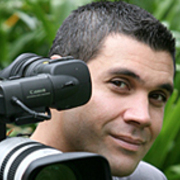
Damon Fepulea'i
Damon Fepulea'i was five when Star Wars transported him to a galaxy far away. The magic of the George Lucas space saga showed him storytellers could create other worlds.
Fepulea'i was born in Auckland to a Samoan Dad and Palagi Mum. His family shifted to Avondale when he was a baby, and their home became a hub for his Samoan extended family. Fepulea'i was always doodling and drawing at school. One day his mum bought a brand new computer — a Commodore Vic 20 — and his imagination was fired. He would buy computer magazines and try to create computer games. When he was at Avondale College, the family upgraded to a Commodore Amiga and Fepulea'i started doing basic animation.
After high school he enrolled in a business computing course, but left halfway through. He enrolled at Auckland University and was going through the motions in an arts degree, when he saw an ad for a two year TV and Film course at Carrington Polytechnic (now Unitec Institute of Technology). He applied and was accepted, and for the first time felt he was in the right place. "I’m glad I was three years out of high school when I was accepted. Most of the class weren’t that focused, but for the first time I started to excel. My parents were so relieved..."
His first television job out of the course was with Kids TV, a small cable channel. He dubbed tapes and trained in the editing suite. His bosses knew he fancied directing; in 1998 he took the reins for the live-to-air Kids TV Club. "The audiences were so small that it was the perfect training ground for any new director."
Fepulea'i had started writing his own scripts. His first short film Watermark (2001) came about through a collaboration with a childhood friend, Savage (not the musician). Savage was visiting family in Tonga when he spotted a couple of girls in an inner-tube, floating down the river. That image of peace and danger stuck with him. Watermark tells the story of a young girl who is caught by the rising tide while out spearfishing.
Fepulea'i had a clear vision for the story, and insisted on shooting on film, resulting in a very tight budget. He was vindicated: the film was invited to 20 international festivals and won Best Film, Actress and Cinematography at the 2002 Drifting Clouds Film Festival. It remains a career high point. "It looked beautiful. It was my first time directing a film and I wanted it to be cinematic, to have that magic film used to have."
While working as an editor, he was asked to direct his first documentary. A Life in Death (TV1) looked into the funeral business. In 2003 he directed and edited Dawn Raids. The documentary recounts a painful time in New Zealand’s history when the Muldoon Government enacted a series of police raids across Auckland in the mid 1970s, imprisoning alleged Pacific Island ‘overstayers’. Fepulea'i’s family were never targeted and as a child he wasn’t aware of what was happening in his wider community.
His first taste of directing TV drama was on The Market (2005), the first long-running Pacific Island drama series. He also wrote and directed a second short film, Karma (2004).
He went on to direct and edit documentaries for the Play it Strange high school songwriting competition. His 2006 Play it Strange documentary was nominated for Best Children’s Programme at the Qantas Film and Television Awards, and in 2008 it won the category. In 2009 his doco Life, Death and a Lung Transplant was nominated for Best Documentary.
From 2008 to 2013, Fepulea'i was part of Goodfellas, a 48 Hour Film team who dominated the Peter Jackson Wildcard category of the competition. Fepulea'i’s favourites are In Search of Big Foot (2008) and Broken Silence (2013).
In 2010 Fepulea'i began adding comedy to his CV, directing two seasons of Jono Pryor’s show The Jono Project for C4. In 2012 Pryor joined fellow performer Ben Boyce to create Jono and Ben at Ten; Fepulea'i stayed on to direct across five seasons of the fast-paced show. He relished the variety; in any one episode several genres could feature, from ‘zombie apocalypse to film parodies’ to straight pranks.
He added TV3’s Funny Girls to his comedy credits in 2018, as well as a pilot episode for ‘buddy cop comedy’ Mangere Vice for TV3’s Comedy Challenge.
Fepulea'i continues to direct documentaries, including two seasons of NZTV Awards nominee Forensics for Prime TV, and Life After Footy (2018). The latter captures "amazing stories" from former top level Pacific Island rugby and league players such as Michael Jones and Bryan Williams, discussing life after being the ‘tough guy’ on the field.
In 2023 Fepulea’i directed his debut feature film Red, White and Brass, following a group of Tongan friends as they formulate an audacious plan to form a brass band to perform at the Rugby World Cup, in order to score free tickets to the sold-out game.
In an interview, Fepulea’i said that the film was "meant to be a feel-good film right from the start. The game plan was always to capture that Tongan energy and the extraness. And the film explores what it means to be Tongan”. Inspired by a true story, Fepulea’i co-wrote the script alongside writer Halaifonua Finau, who was a member of the original brass band.
Profile written by Gabe McDonnell; updated on 8 March 2024
Sources include
Damon Fepulea’i
'Life After Footy - Legends of the Pacific' Prime Television website. Accessed 4 April 2019
'Life after sports - Pacific legends share their stories' (Radio interview) Radio New Zealand website. Loaded 15 July 2018. Accessed 8 March 2024
Sarah Ward, 'Turning Tongan Pride Into the Feel-Good Hit of 2023: Damon Fepulea'i and JP Foliaki Talk 'Red, White & Brass'' (Interview), Concrete Playground website. Loaded 26 June 2023, Accessed 8 March 2024
Watermark press kit